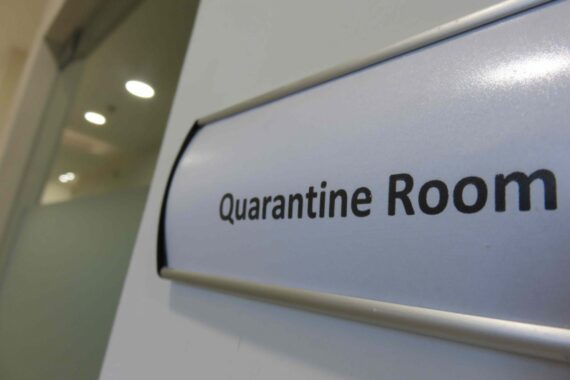GPs told to isolate suspected Ebola patients in an empty room

GPs should isolate patients with suspected Ebola virus in an empty room in the practice, an alert from the UK Health Security Agency (UKHSA) has said.
This follows an Ebola outbreak in Uganda, which has so far seen 63 confirmed cases and 29 suspected cases.
NHS professionals across primary care, urgent care, and emergency departments have been urged to consider Ebola as a potential diagnosis for every patient coming back from five outbreak areas in Uganda.
These are: Mubende and Kassanda districts in Central Region, and Bunyangabu, Kagadi and Kyegegwa districts in the Western Region of the African country.
Guidance from the UK Health Security Agency (UKHSA) said that ‘if the patient presents to primary care and initial clinical assessment using the flowchart in the ACDP guidance indicates [Ebola virus disease], they should be isolated immediately in an empty room.’
The guidance, which mirrors advice from previous Ebola outbreaks, also said GPs must also liaise with the local infection prevention and control (IPC) tram and carry out appropriate testing and infection control measures after a discussion with local virology/microbiology consultants.
UKHSA said that if EVD is still suspected after discussions with the IPC team, a ‘specialist ambulance transfer should be arranged to a dedicated inpatient facility for detailed clinical assessment and treatment.’
Moreover, GPs and primary care networks should ensure that they have adequate stocks of PPE in case they encounter a patient with suspected Ebola.
This should include double gloves, fluid-repellent disposable gown (or coveralls), full-length plastic apron, head cover, fluid repellent footwear, full face shield or goggles, and fluid-repellent FFP3 respirator, according to the UKHSA alert.
GP practices also need to check if relevant staff are trained to assess and treat patients suspected with EVD.
In 2020, GPs were asked to take similar measures and prepare isolation spaces for suspected Covid cases. In November 2021, patients had to isolate based on their travel history to curb Omicron spread.
Pulse October survey
Take our July 2025 survey to potentially win £1.000 worth of tokens

Visit Pulse Reference for details on 140 symptoms, including easily searchable symptoms and categories, offering you a free platform to check symptoms and receive potential diagnoses during consultations.
Related Articles
READERS' COMMENTS [5]
Please note, only GPs are permitted to add comments to articles










I like Uganda. That’s why I booked a flight there tomorrow via Istanbul. £689. No questions asked. I’ll isolate my cassava that I bring back via Heathrow, nothing to declare aisle.
No empty rooms. Full of ARRS.
One for the clever doctors at the hospital I think.
Why would they even present at GP surgeries?
They should receive instructions, on the flight home, and all those already here should receive text alerts and postal information immediately to inform them of the risks and to quarantine them for a suitable period (possibly slightly less than 40 days, but I don’t mind if they want to stay in isolation longer, at least they will avoid the covid the government is intent on spreading around everyone who comes into this country).
Airlines know exactly who has travelled with them, and can inform them as part of the price taken from travellers – travel medicine is a private service from which travel agents profit, after all.
No patient with fever, cough, unexplained bleeding or jaundice, should gp near a GP surgery or chemist – they need to be triaged by the Tropical Disease Team first, and straight to hospital in isolation. Otherwise they will be a risk to other patients.
Is it possible to isolate in a room that is not empty (presumably of other people)?
No doubt every GP practice is fully equipped with the total recommended ‘PPE’ – as per the last paragraph – especially the ‘fluid repellant footwear and fluid repellant FFP3 respirator.
Whose reality is this?